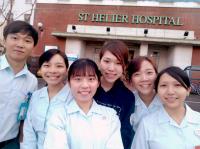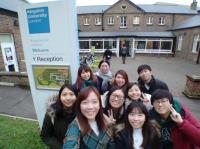Ms WONG Wai Lam joined a volunteer service trip to Cambodia during Term 1, 2018–19.
Please refer to the Chinese version of this page for her sharing.
Exchange Visit to Kingston University and St Helier Hospital, the United Kingdom (Ms WU Yu Ying, Year 5, Nursing)
During the exchange visit on 11–24 November 2018, I attended lectures in Kingston University and observed the daily ward routines and nursing care to patients in St Helier Hospital.
After attending the lectures and mini-classes the staff from the University tailored for us, I learnt a lot and gained a more comprehensive picture about the healthcare services provided by the National Health Service (NHS) in the UK. The most notable lecture was about the primary nursing care. The lecturer was a general practice (GP) nurse, who can take up a variety of jobs such as prescribing and titrating medications, triaging on telephone, interpreting electrocardiographs (ECGs) along with regular nursing work (The Queen's Nursing Institute, 2016). This is truly amazing that nurses in the UK can have such a high autonomy and authority to treat their own patients. It is utterly not the same in Hong Kong. Nurses in Hong Kong still follow the orders by the doctors and cannot do prescriptions. Under the healthcare system in the UK, nurses there are more professional and competent to handle cases on their own.
For the observational clinical placement, I spent my time in an elderly male ward in St Helier Hospital. What I could observe was that the patient care was quite different from that in Hong Kong. There were fewer patients per ward and the nurse-to-patient ratio was more favourable. Therefore, the staff did not have to hurry to finish the routines and nursing care. They had more time to boost patients' independence, such as assisting them to walk. In addition, there was a detailed hospital menu for the patients to choose their own meals every day. Desserts, snacks, tea and coffee were also served for them. There was even a barber in the hospital providing free haircut and shaving service for patients. In contrast, the services for the patients in Hong Kong are quite poor in the hospital. What is more, there was a multi-disciplinary meeting involving physicians, nurses, pharmacists, physiotherapists and occupational therapists to discuss the progress of each patient every morning in every ward. That was quite eye-opening to me, as medical staff in Hong Kong hospitals can hardly have the time to call such formal meetings. Therefore, I think the healthcare system in the UK really develops well in terms of advocating patients' holistic care.
I was especially impressed by the client-focused care offered by the hospital to its patients. On the first day in the ward, an old man would like to walk to washroom with our aid. He looked so weak and fragile that in hospitals in Hong Kong he would be stopped from toddling to the lavatory in hospitals in Hong Kong. However, the staff in the UK did assist him. Through this episode, I noticed that the staff there really made every effort to promote patients' independence in their daily life. Moreover, they usually put one of the bedside rails down, so that the patients would feel better in not being restricted. The staff would then keep an eye on them closely to prevent falls from the beds. The staff did not sacrifice patients' freedom for the sake of alleviating their workload.
After this exchange visit, I acknowledge that there are various types of caring to patients and the healthcare professionals are the ones to choose and determine the management style that suits patients best. I recognised that the first priority for a nurse is to treat every patient at his/ her best interests rather than just focus on the massive paperwork. This outreach experience has prompted me to think and learn more independently, as I was there to experience and understand the advantages and disadvantages of everything in the UK by myself. It has equipped me with a more mature thought, and reinforced my personal growth by giving me a break to have self-reflection on the situation in Hong Kong and what can be done to augment the healthcare service and caring quality to patients before entering this field.
In future, I will strive to nurse every patient with holistic care. I will remind myself that the most respected value of being a nurse is to care for each client with heart and patience. What the patients need in hospital is not solely the medical and nursing therapies, but also our concern and respect.






















